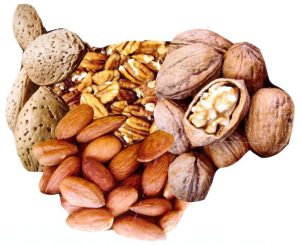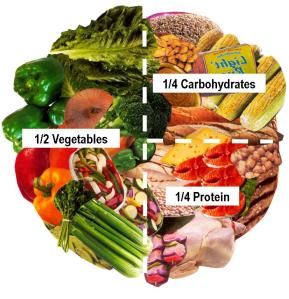Having studied nutrition for more than ten years, I’ve reached the conclusion that the gist of healthy eating can be explained by five principles…the first two are borrowed from Plato
1)Know Thyself
Ultimately, everyone’s ideal diet is different.
Thus, there’s no secret to eating-well, it depends on you…and your genes, how much you exercise, your occupation, your culture, how much stress you’re under, what you like/dislike, and so much more.
Hence, what works for someone else, may or may not work for you. So try everything, self-experimentation is vital!
Also, it’s important to know that what works for you today, may not work for you tomorrow or six months from now, or six years from now. We are constantly changing and thus our diets must also change over time.
2)Nothing in Excess
We overeat. And there are two main reasons why.
First, we overeat because we don’t eat real food. Consider real food, like raw nuts, such as almonds.
Even if you were really hungry, how many almonds could you possibly eat? Ten…maybe fifteen? After all of the laborious chewing and the consistent earthy taste you eventually stop eating.
Now, contrast that with chips…when hungry, one could easily eat an entire bag and still crave more! This is the problem. Processed food is engineered to taste too good, and that a big part of the reason why we can’t stop eating it.
The second reason we overeat is that our meals lack balance…balance is the third principle of healthy eating.
3)Balance
The most important piece of advice that I can give anyone is this…when it comes to lunch and dinner, strive to fill half your plate with vegetables, then fill approximately one-quarter with carbohydrates (like bread, rice, pasta) and one-quarter with protein (like meat, fish and beans).
This is what healthy eating looks like…
And with respect to breakfast, you can leave off the vegetables and combine carbohydrates and protein. Like this…
While every single meal doesn’t have to perfectly meet these proportions, every lunch and dinner should have all three components: carbs, protein and vegetables, plus some fat (1 tablespoon of oil/butter for every two cups) alongside the vegetables to enable the absorption of the nutrients they contain.
Too often, we eat unbalanced meals consisting of only one type food, such as a dish of pasta. The problem with a carb-only meal is that it is digested too quickly, and then leaves us feeling hungry again within hours. This can easily be solved by combining different types of foods (like carbs, protein and fat). The body has to work harder to digest all of these different types of food, and by making the job harder, we feel more satisfied in the long run.
Similarly, too often we eat unbalanced meals that leave out a food group, like carbohydrates, a classic dieter’s tactic. This is equally troublesome because many different signals need to be sent from our digestive system to our brain in order to feel full. These different signals are stimulated by different foods…so while some are released after the ingestion of carbs, others are stimulated by fat and protein. Thus, if you leave out a particular food group, certain signals never get sent and the brain keeps telling the body it’s hungry. Furthermore, leaving out carbs is one of the worst things you can do, because the satiety signals that are stimulated by carbohydrates amplify the signals stimulated by protein and fat. So the bottom line is, you won’t feel full unless you’ve got carbohydrates, protein and fat in each meal meal.
4)Structure
When you eat can be as important as what you eat. Ideally you should strive to maintain a consistent meal pattern throughout the day. Whether it’s three meals a day, or three meals plus two snacks, figure out what works for you and stick with it because one of the root causes of overeating is meal-skipping, which always leads to uncontrollable eating later on.
5)Make treats, treats
It’s perfectly okay to indulge yourself every once and a while, just don’t make a habit of it.
That’s it. That’s the gist of what you need to know. Too often we get caught up in the details, but in fact, eating-well is about the big picture. In order to be healthy, remember:
- You’re the only one who can figure out what your ideal diet is
- Create a meal schedule that works for you and stick to it
- Balance your meals
- Avoid overeating by eating real food instead of processed foods
- Treat yourself, sometimes
The foundation of a healthy diet is that simple.



